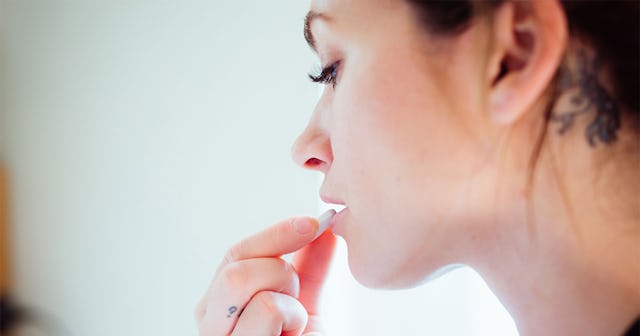Nootropics Are Alcohol Alternatives, But Are They A Good Idea?

This is the time of year when many of us find ourselves at social gatherings. Often times those parties include indulging, sometimes overindulging, in a cocktail or two — and feeling the aftereffects the next morning. No one likes to have a hangover, but there are new products on the market that claim to give the same buzz as booze … without the alcohol that can leave us feeling like garbage the next day. The idea is intriguing, but is it really a safe alternative?
These alcohol alternatives blend nootropics, adaptogens, and botanics that are purported to give the calming effect of alcohol. One such product is Kin Euphorics. According to Bulletproof, “This alcohol alternative claims to help you achieve a blissed-out state without sacrificing brain cells or performance the next day.”
So what is a nootropic? WebMD gives us a bit of insight: “The term ‘nootropics’ first referred to chemicals that met very specific criteria. But now it’s used to refer to any natural or synthetic substance that may have a positive impact on mental skills. In general, nootropics fall into three general categories: dietary supplements, synthetic compounds, and prescription drugs.”
Are they safe? They can be, but just like anything else, they need to be used in moderation.
“I would be reluctant to recommend something that is so new. These are chemicals, and their impact is not clear. I do not have enough information to know what is a safe amount, or what is the potential for dependence,” said Dr. Matthew Reuter, a BJC Medical Group internist at Missouri Baptist Medical Center.
And although there is a possibility that you can get the same boozy feelings sans booze, there are certainly questions about whether or not they are a safe alternative to alcohol. Dr. Reuter isn’t the only medical professional who agrees that we should proceed with caution. Dr. Anna Lembke, medical director of addiction medicine at Stanford University School of Medicine and author of Dopamine Nation, told Time, “There’s always the promise of some new molecule that’s going to do exactly what the old molecule did but not have the harmful effects. … Every single time, that has not panned out.”
We have seen this before with things like E-cigarettes. They were lauded as a safer alternative to smoking, but that has proven to be untrue — and an increasing number of people are heading straight to the vape and skipping cigarettes altogether. Are nootropics the same? Perhaps, but they are big business right now, and production doesn’t seem to be slowing down.
Grand View Research reports that nootropics were valued at $9.7 billion in 2020. That accounts for all forms of nootropics, not just alcohol alternatives. But the drinks are gaining popularity the quickest.
“The drinks segment is projected to register the fastest CAGR of 16.0% from 2021 to 2028. Nootropics ingredients are being incorporated into RTD drinks and shots to help improve functions such as focus and memory. Nootropics in drinks form are gaining popularity due to their ability to be digested more quickly than food, allowing them to boost the brain instantly,” Grand View Research states.
What about those who have given up drinking or are in recovery; could this be a gateway? Dr. Reuter said that it is not a good idea. “My gut is these should be avoided. Patients with addiction to alcohol need to abstain entirely from alcohol to minimize risk of relapse.” This makes sense, as it could certainly be a gateway back to alcohol, as it can mimic that euphoric feeling.
Some nootropics are not only marketed to replace alcohol, they are also being touted as brain boosters. They are said to give a bit of mental clarity and increase focus. They can also up your energy. There is not a lot of research to back up whether nootropics can really help cognitive function or make give you a euphoric feeling, but many swear by them.
Interestingly, a lot of us are consuming a nootropic on the daily and may not even realize it. Caffeine falls into the category of nootropic. And as we know, it can definitely give us a boost of energy and make our cognitive function a bit better. Having said that, the nootropic compound in caffeine is much smaller than that in many of the nootropic drinks on the market today, so don’t think that you will be getting the same effect. Think alcohol proof: The higher the proof, the stronger your reaction. The same is true with nootropics.
There is no clear conclusion about alcohol alternative nootropics and whether you should give them a try or not. There is little risk of dependency, and they don’t cause the negative hangover side effects, but Dr. Reuter still thinks we should play it safe. “I would consider real alternatives such as water, tea, lemonade or even soda. We seek alcohol in social settings or to relax. It can be dangerous in and of itself. I would be very skeptical thinking there is a safe alternative that impersonates alcohol.”
So, proceed with caution. Know your limits and listen to your body. If it feels off, it probably is, and you should put the glass down and grab a bottle of water. Just to be safe.
This article was originally published on